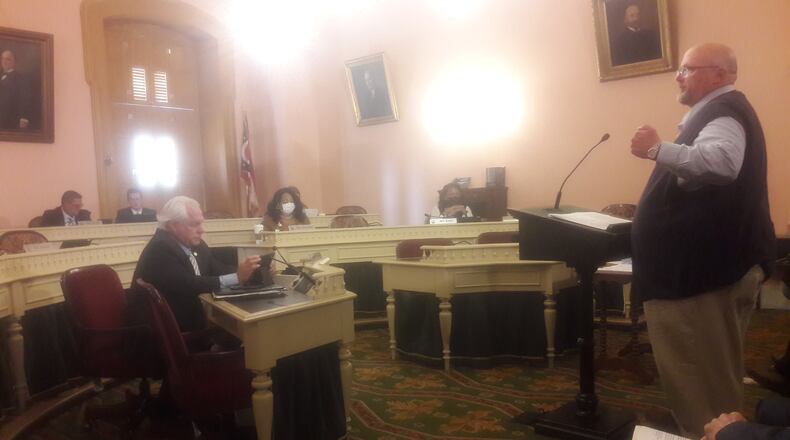During police traffic stops, people carrying concealed weapons would not have to tell officers that they’re armed. Nor could police stop and search “otherwise law-abiding” people just because they’re carrying a weapon.
The bill is sponsored by Reps. Thomas Brinkman, R-Mt. Lookout, and Kris Jordan, R-Ostrander, filed the bill in March. It came up for a fourth hearing on Thursday.
About a hundred testified at the bill’s third hearing in June, a mix of supporters and opponents. Even more signed up this time, though much testimony on both occasions was submitted in writing. Some of those who testified in June returned to speak at Thursday’s hearing.
An earlier version failed in the previous General Assembly session. This time it has a very similar companion: Senate Bill 215, filed in August by Sen. Terry Johnson, R-McDermott, which has gotten two hearings before the Senate Veterans and Public Safety Committee.
After the three-hour meeting Rep. Shane Wilkin, R-Lynchburg, the committee chair, was noncommittal on whether HB 227 would see a vote at its next hearing.
Twenty-one other states already allow “permitless carry,” said Rob Sexton, legislative affairs director for the Buckeye Firearms Association.
Opponents of the bill touted the value of the 8-hour training session now required for a concealed carry permit. One was Andrea Yagoda, who said she has had a concealed carry permit for many years – but said she would probably have delayed or disregarded training if it wasn’t required, and that many others probably would do the same.
“The mandatory education and training were invaluable to me,” Yagoda said.
Several opponents testified wearing red “Moms Demand Action” T-shirts. Moms Demand Action is a campaign of Everytown for Gun Safety.
Doug Rogers, a lawyer who said he has represented police organizations in court, said the Ohio Association of Chiefs of Police and the Fraternal Order of Police opposed previous attempts at passing permitless carry.
Likewise, Shannon Mulligan asked if the bill’s sponsors had consulted Ohio law enforcement groups that resisted earlier versions of the bill.
“If they are not supportive of this bill, then how could you be?” she said.
Firearm discrimination
Rep. Scott Wiggam, R-Wayne County, spoke at the first hearing of his HB 297, dubbed the “Firearms Industry Nondiscrimination Act.”
It would prohibit any government entity in Ohio from doing business with a company without written proof the company doesn’t “discriminate” against makers or sellers of guns, ammunition and accessories, shooting ranges or firearm trade associations.
The bill would only apply to future contracts, to contracts worth $100,000 or more, and to companies with 10 or more full-time employees.
The definition of “governmental entity” includes not just all parts of state government, but universities, counties, townships and cities.
The Ohio Legislative Service Commission’s analysis warns that applying the bill to local governments might violate Ohio’s home rule law.
Wiggam said he would soon file a substitute bill to “better explain some of these details.” The initiative is based on a new Texas law, he said.
Emergency powers
Another bill sponsored by Wiggam got a second hearing Thursday, with only proponents speaking. House Bill 325 would prohibit any Ohio government from restricting gun possession, carry or “otherwise lawful use” during any sort of declared emergency.
During an emergency governments could not restrict or seize firearms, alter the licensing process, or restrict hunting and fishing, the bill says.
It would let police “suppressing a riot or mob” cordon off the area and prohibit entry “except when carrying on necessary and legitimate pursuits.”
“The NRA fully supports House Bill 325 and applauds Rep. Wiggam for its introduction,” said John Weber, state director of the National Rifle Association’s lobbying arm.
Sexton said 24 other states have similar laws.
Knife regulation
A bill from Rep. Al Cutrona, R-Canfield, would extend protections for knife makers. House Bill 243, up for its third hearing, would prohibit Ohio governments from regulating or taxing knives or knife parts, and prohibit taxing knife manufacture more highly than other commercial goods. The Ohio Legislative Service Commission noted this might also violate the home rule law.
Committee member Rep. Bill Seitz, R-Cincinnati, moved to amend HB 243 to make it align with SB 156. That bill, sponsored by Sen. Kristina Roegner, R-Hudson, would do essentially the same.
Seitz said Cutrona supports the change. The amendment passed 7-3.
About the Author

